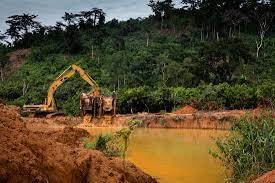Illegal mining, often referred to as artisanal and small-scale mining (ASM), remains a prevalent issue in various regions worldwide, presenting profound environmental, economic, and social implications. With a surge in demand for valuable minerals and a lack of effective regulation, illegal mining continues to pose significant challenges to sustainable development and the well-being of affected communities.
### The Menace of Illegal Mining
Illegal mining involves the extraction of minerals using methods that breach environmental regulations and often exploit vulnerable labor forces. This practice, while yielding economic benefits for some, frequently descends into a cycle of exploitation and environmental degradation. The allure of quick profits and insufficient alternatives often drive individuals and groups to engage in this activity, resulting in numerous repercussions on both local and global scales.
### Environmental Impacts
One of the most pronounced consequences of illegal mining is its detrimental impact on the environment. By circumventing standard mining regulations, illegal miners often resort to rudimentary techniques, such as open-pit mining and the use of dangerous chemicals like mercury and cyanide. This leads to deforestation, soil erosion, water pollution, and the disturbance of fragile ecosystems. The long-term repercussions on biodiversity and ecosystem health are significant and can endure for generations.
### Economic Ramifications
While illegal mining can bolster the incomes of participants in the short term, its economic implications can be deleterious in the long run. It often denies governments of vital revenue from mining activities and hampers efforts to implement sustainable resource management. Furthermore, the lack of oversight and accountability facilitates illegal trade and compromises the integrity of global mineral supply chains, potentially affecting international trade relations and market stability.
### Social Challenges
Illegal mining frequently thrives in marginalized communities, exacerbating social challenges and perpetuating cycles of poverty. The proliferation of illegal mining can lead to land disputes, forced labor, and unsafe working conditions, all of which jeopardize the welfare and human rights of the individuals involved. Moreover, it can contribute to the erosion of traditional cultural practices and disrupt community cohesion.
### Addressing the Issue
Tackling illegal mining demands a multifaceted approach that includes enacting and enforcing stringent regulations, promoting sustainable alternatives, and engaging with affected communities. Governments, in collaboration with international organizations and local stakeholders, should prioritize the implementation of responsible mining practices and the empowerment of lawful mining operations.
The menace of illegal mining permeates various aspects of society, engendering environmental devastation, economic instability, and social hardships. As global demand for minerals persists, addressing this issue becomes imperative for achieving sustainable development and preserving the well-being of affected communities. By fostering responsible mining practices, upholding regulatory standards, and promoting community engagement, strides can be made in mitigating the adverse impacts of illegal mining and contributing to a more sustainable and equitable future.



No comments yet
Be the first to share your thoughts!